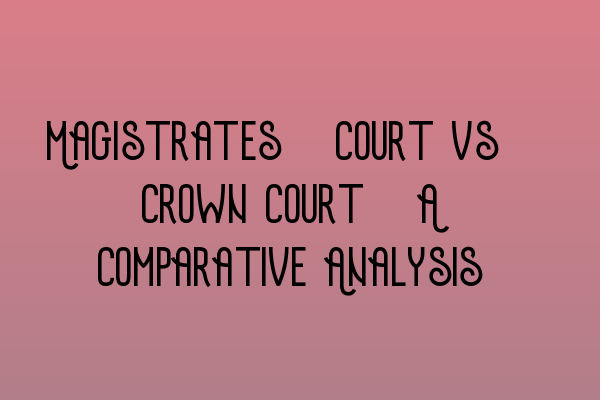Magistrates’ Court vs. Crown Court: A Comparative Analysis
Welcome to our comprehensive comparative analysis of Magistrates’ Court and Crown Court in the UK criminal justice system. Understanding the key differences between these courts is essential for anyone involved in SQE Criminal Law & Practice in the UK.
1. Jurisdiction and Authority:
The Magistrates’ Court is the lower court in the UK criminal justice system, dealing with less serious criminal offences. It has limited jurisdiction and handles preliminary hearings, bail applications, and summary trials. On the other hand, the Crown Court has more extensive jurisdiction and deals with serious criminal cases that require a trial before a judge and jury.
2. Composition and Decision-Making:
In Magistrates’ Court, cases are presided over by either a single magistrate or a panel of three magistrates, known as lay magistrates or justices of the peace. They decide the verdict and impose sentences. In Crown Court, a judge and jury compose the decision-making body. The judge oversees the trial and provides legal guidance to the jury, who then determines the guilt or innocence of the accused.
3. Sentencing Powers:
Magistrates’ Court has limited sentencing powers. They can impose fines, community orders, and short custodial sentences. Crown Court, on the other hand, has wider discretionary powers and can impose longer custodial sentences, including life imprisonment for the most serious offences.
4. Trial Procedure:
Magistrates’ Court trials are usually shorter, less formal, and conducted without a jury. The accused can choose to have their case heard here, or they may opt for a trial in Crown Court. Crown Court trials are more formal, involve a jury, and generally take longer to conclude. Both courts follow strict rules of evidence and procedure, ensuring a fair trial for the accused.
5. Appeals Process:
When it comes to appeals, decisions made in the Magistrates’ Court can be appealed to the Crown Court. Similarly, the decisions of the Crown Court can be appealed to the Court of Appeal and, in some cases, to the Supreme Court of the United Kingdom. The appeals process allows for a review of the decisions made in both courts, ensuring the legal process is fair and just.
Understanding the nuances of Magistrates’ Court and Crown Court is vital for anyone pursuing a career in criminal law. Whether you are preparing for the SQE 1 or SQE 2 exams, having a clear understanding of these courts will serve as a solid foundation for your legal knowledge. Stay diligent in your studies, practice with SQE 1 Practice Exam Questions and SQE 1 Practice Mocks FLK1 FLK2, and enroll in our comprehensive SQE 2 Preparation Courses and SQE 1 Preparation Courses.
